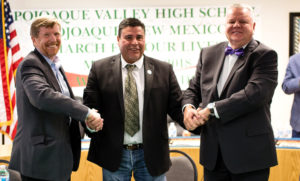
Photo courtesy LANL
Terry C. Wallace, Jr., Los Alamos National Laboratory Director, left, Jon Paul Romero, Pojoaque Valley School District School Board president, and Sam Minner, New Mexico Highlands president, shake hands at a Sept. 26 celebration to launch the Regional Partnership School initiative.
Las Vegas, N.M. – Pojoaque Valley Public Schools, Los Alamos National Laboratory, and New Mexico Highlands launched a Regional Partnership School initiative Sept. 26 aimed at supporting improved teaching and learning.
The innovative partnership is the first of its kind in New Mexico to combine a school district, a major employer, and a university teacher education program. It focuses on increasing success for youth in grades 4th through 8th.
“New Mexico Highlands University is proud to be the higher education institution partner for the Regional Partnership School,” said Sam Minner, Highlands University president. “The opportunity to work with the Pojoaque Valley School District and Los Alamos National Laboratory to enhance the education of pre-service and in-service teachers in a school setting will ensure that our teachers are prepared to go into classrooms ready to meet the needs of students.”
The Regional Partnership School is also intended to be a model for New Mexico educators and policy makers.
“The value of education and the critical role it plays in the future success of both Northern New Mexico and Los Alamos National Laboratory cannot be overstated,” said Terry C. Wallace, Jr., the director for LANL. “Given this, we’re very excited to collaborate with our K-12 and higher education partners to bring a new approach to teacher professional development to Northern New Mexico. By helping to support our educators, we also support our students—and we all benefit.”
Jon Paul Romero, president for the Pojoaque Valley School District Board of Education, said: “I’m delighted Pojoaque can be part of this innovative development. Out students deserve this.”
Virginia Padilla-Vigil, interim dean for the Highlands School of Education, said the Regional Partnership School initiative is based upon a national best-practice professional development school approach.
“A professional development school is a partnership between a school and an educator preparation program like the Highlands School of Education,” Padilla-Vigil said. “With this model, teachers in training have the opportunity to directly apply what they are learning in the college classroom in a real-world school environment. Mentors and teacher education faculty embedded in the school provide important support and guidance.”
Padilla-Vigil said the outcome of professional development schools is improved pre-kindergarten through 12th grade student learning.
“One reason for this increased student success is that there are more professionals working with the student as a team, which makes it possible to better individualize instruction. Another benefit of professional development schools is that teacher education faculty who are also immersed in school settings grow professionally and remain current in their practice,” Padilla-Vigil said.
Padilla-Vigil said the Regional Partnership School initiative involved a year of intensive collaborative planning to conduct research and create the model.
“It’s exhilarating to see this collective effort come to fruition,” Padilla-Vigil said.
The Regional Partnership School team members include Steve Weatherburn, field experiences director, and German Moreno, visiting associate faculty, from the Highlands School of Education; Teri Vaisa, intermediate school principal, Pojoaque Valley School District; and Zachary Leonard, Monica Martínez-Archuleta, Lorenzo Gonzales, and Randall Merker from the LANL Community Partnership Office.
